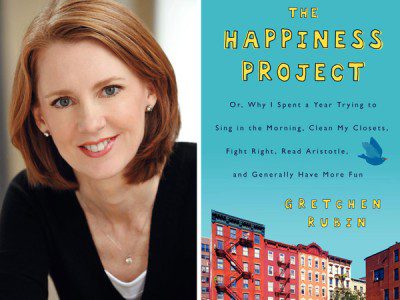What did I just finish reading? The Happiness Project by Gretchen Rubin.
This book was not on my reading list. I saw it at my local second-hand shop one day for a dollar and it piqued my curiosity. It seemed like one of those frou-frou, feelgood, self-help books, but it wasn’t that bad. I actually liked it and found it insightful. Allow me to share some of my favourite insights.
The author, Gretchen Rubin, is pretty intense. She admits to being ambitious, competitive, achievement-driven, very type A, a former lawyer turned writer. Married and with two children, she believed she was happy, but she felt that she could be better at recognising and appreciating that happiness. She complained too much, got annoyed too often, wanted to feel more grateful. So, she tackled happiness the only way she knew how, with dogged determination.
It was a perfect book to read at the beginning of the year because of that wonderful New Year energy that fills so many people with the determination to make improvements in their lives.
It was time to expect more of myself. Yet as I thought about happiness, I kept running up against paradoxes. I wanted to change myself, but accept myself. I wanted to take myself less seriously – and also more seriously. I wanted to use my time well, but I also wanted to wander, to play, to read at whim. I wanted to think about myself so I could forget myself. I was always on the edge of agitation; I wanted to let go of envy and anxiety about the future, yet keep my energy and ambition… Was I searching for spiritual growth and a life more dedicated to transcendent principles – or was my happiness project just an attempt to extend my driven, perfectionist ways to every aspect of my life?
That spoke to me. Does it speak to you?
Rubin did exactly what I would do – a lot of research, note-taking, charts. Yeah, it’s all pretty anal-retentive. But is this a good thing or does it amount to little more than navel gazing?
I gave this question a lot of thought. In the end, I sided with the ancient philosophers and modern scientists who argue that working to be happier is a worthy goal. According to Aristotle, “Happiness is the meaning and the purpose of life, the whole aim and end of human existence.’ Epicurus wrote, ‘We must exercise ourselves in the things which bring happiness, since, if that be present, we have everything, and, if that be absent, all our actions are directed toward attaining it.’ Contemporary research shows that happy people are more altruistic, more productive, more helpful, more likable, more creative, more resilient, more interested in others, friendlier, and healthier. Happy people make better friends, colleagues, and citizens. I wanted to be one of those people.
Rubin embarked on a year-long happiness project. She picked a theme for each month and about five resolutions for each. For example, the theme for January was Vitality and the resolutions were to go to sleep earlier, exercise better, toss, restore, and organise, tackle a nagging task, and act more energetic. My happiness project would be different and so would yours.
I have an idea of who I wish I were, and that obscures my understanding of who I actually am.
In May, the theme was Leisure. Rubin wanted to Be Serious About Play. She realised that what’s fun for her isn’t necessarily fun for others, and vice versa. We all know this, but it doesn’t necessarily stop us from feeling guilty.
But I have to admit it – being Gretchen and accepting my true likes and dislikes beings me a kind of sadness. I will never visit a jazz club at midnight, hang out in artists’ studios, jet off to Paris for the weekend, or pack up to go fly-fishing on a spring dawn. I won’t be admired for my chic wardrobe or be appointed to a high government office. I’ll never stand in line to buy tickets to the Ring Cycle. I love fortune cookies and refuse to try foie gras.
It makes me sad for two reasons: First, it makes me sad to realize my limitations. The world offers so much! -so much beauty, so much fun, and I am unable to appreciate most of it. But it also makes me sad because, in many ways, I wish I were different.
We can do (almost) anything, but not everything, and a door is always closing. I’ll never see this beautiful planet from outer space. I’ll never deep-sea dive. I’ll never be a scholar. That makes me a little sad. I’ll never have a child. I don’t even want one, but the fact that the door is closing makes me a little sad.
The days are long, but the years are short.
Other areas that Rubin tackles are marriage, work, parenthood, friendship, money, eternity, books, mindfulness, attitude, and happiness itself.

Reading The Happiness Project, I could tell that it was hard for Rubin. Like a lot of people, she snapped at her husband, nagged him, yelled at her children, gossiped with her friends, and struggled with rejection and failure. As it turns out, it’s easy to be sarcastic, passive aggressive, judgemental, critical, and it’s much cooler to be sombre and detached, that it’s sign of depth. It’s harder to be happy. It takes greater effort, humility, generosity, and discipline. And the happy, light-hearted person is always taken for granted.
It is easy to be heavy, hard to be light.
One of my favourite aspects of the book is all the research that Rubin did and shares. Things like the hedonic treadmill, the arrival fallacy, and the fundamental attribution error. It’s also full of great quotes by greater minds.
Rubin hit all her goals, but didn’t keep all her resolutions. That’s okay. A big part of the project turned out to be acknowledging what made her happy, not what she wished made her happy, and appreciating the life she has. Along the way, she created her lists of life rules (which she calls Splendid Truths and Secrets of Adulthood). In the end, she found how to be happier.
I won’t be embarking on my own happiness project – or maybe I do that already every day, I’m not sure. But I am taking some of Rubin’s observations to heart, and it has prompted me to reflect more on the person I am and what makes me happy.
For more information about The Happiness Project, visit http://gretchenrubin.com/.


Really nice overview of the book! I’ve been thinking about picking this up many times over the past few years, but never actually did. I think I can relate about acknowledging what makes you happy, not what you wish made you happy. I’d also say acknowledging what you think makes others happy that you think should make you happy too.